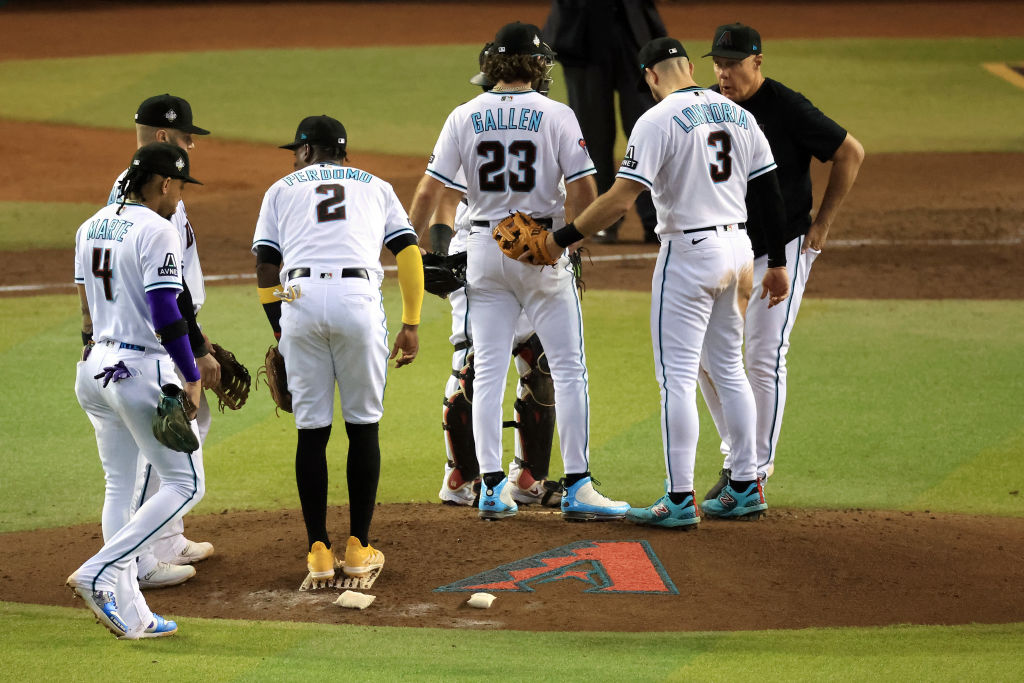Here's a totally hypothetical thought experiment. It's the seventh inning of a must-win Game 5, and your starter Zac Gallen is, to use the technical term, dealing. He has allowed zero runs on one walk and no hits, but by nature of how these things go, the opposing starter Nathan Eovaldi, despite giving up four hits and five walks, has somehow also allowed zero runs. An injustice! Gallen is under 80 pitches, but it's the third time through the order, and Corey Seager is coming up to bat. With the game tied and the Gink as a ready option in the bullpen, do you pull Gallen?
The answer, I think, is pretty resoundingly a "no," though this is less a statistical or even aesthetic argument than a moral one. Gallen, who hasn't been having a great postseason, has a no-hitter going, and you can't pull a guy who has a no-hitter going, even if it's the third time through the order. But do you pull him once Corey Seager hits a two-strike single? The no-no's off, but good pitchers give up singles all the time, and this one was a weak ground ball with a .120 expected batting average. What about once Evan Carter hits a line-drive double?
What Torey Lovullo did was pull Gallen after two further at-bats: a Mitch Garver single that scored Seager and a Josh Jung strikeout. The damage was done. The Rangers had taken the lead, 1-0, with Seager scoring the game-winning run. Zac Gallen finished with 6.1 innings pitched, three hits, one walk, and one run, which was one run more than Nathan Eovaldi, who had, touch-and-go as it was, managed to make it three times through the order.
Not to get too in the weeds after the baseball season is officially done and dusted, but if Lovullo had pulled Gallen after the Seager single, and Kevin Ginkel had given up the same Evan Carter double and Mitch Garver single, the reaction would've been hysterical—and a near-universal certainty that Lovullo had pulled Gallen too early. Historically speaking, pulling starting pitchers who are dealing in the playoffs—Kevin Cash pulling Blake Snell for Nick Anderson after 5.1 innings in 2020 and John Schneider pulling José Berríos for Yusei Kikuchi after only 3.1 innings this year, as two examples—has been lambasted, especially when the relievers come in and immediately give up a run.
The thing about pulling pitchers before the third time through the order is that it's purely preventative. If it works, you forget about the decision because no runs were scored; if it doesn't, it's eternal damnation and hellfire. Whatever the correctness of Cash and Schneider's decisions, Gallen makes for a slightly clearer-cut case. The Gink is in the bullpen, and Gallen's third-time-through-the-order splits are horrible, even more so than your average pitcher: He has an OPS under .650 the first two times through, and an OPS of .827 the third time. On the other hand, the decision to leave Gallen in, much like pulling Berríos for Kikuchi, probably didn't end up mattering. The Diamondbacks couldn't score a single run, and the Rangers scored four more at the top of the ninth in order to seal the game and the title.
One very loud complaint about baseball nowadays, especially after pace of play and lack of steals have been addressed through rule changes, is that starting pitchers don't go long enough, especially in the postseason. A quick glance at recent postseasons supports the factual basis of the complaint—from 1990 to 2017, there was only one season with fewer than 10 games where starters went over seven innings. In the six seasons that followed, even as the postseason has expanded, there have been four such seasons, 2023 included. (As a side note, 2019 stands out as an outlier, as it featured 17 games when a pitcher went seven innings or more, five of which were pitched by Gerrit Cole.)
But the complaint is more aesthetic than statistical. It's not that the third-time-through-the-order penalty is fake (it's very real)—it's that it blows. Managing around it makes for efficient baseball and ugly television, hated for much the same reason as a bullpen game in the World Series is hated. Not everyone loves and adores the Gink. People want to see starters throw complete games or, at the very least, play a part in late-game drama. It's not surprising that in an era of pitching that focuses on power and stuff (another technical term), a pitcher like 2019 Tyler Glasnow who had two good pitches could do great, nor that starters more generally lack the finesse and well-rounded arsenal necessary to retire a major-league hitter who's seeing them for the third time that night.
Managers pull pitchers early because the numbers show that they should, and also because there's no shortage of freak relievers throwing gas (yep: technical term). That's not going to change unless MLB—which is ultimately an entertainment product as much as it is a competition—tweaks rules to force the change. Like, say, removing the DH along with the starting pitcher. Hacky, sure, but no more hacky than—speaking totally hypothetically—putting a runner on second base to start extra innings.






